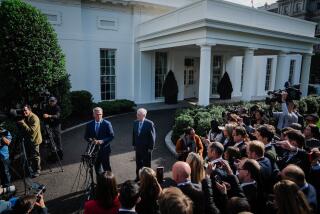NEWS ANALYSIS : How Much Buildup Can the U.S. Afford? : Economy: Stalemate could weaken Bush’s hand, analysts say. Fears of stagflation complicate matters.
- Share via
WASHINGTON — President Bush’s efforts to sustain a major military action in the Mideast may be impeded by the Administration’s failure to get its domestic economic policies in order before embarking on a campaign overseas, economists in and outside government warned Tuesday.
Although the Administration has been praised widely for quickly lining up its diplomatic and military policies in response to Iraq’s invasion of Kuwait, analysts say it has failed to do the same on the economic front--a gap that could backfire if the stalemate drags on.
If the economy further deteriorates in the midst of the crisis, “a lot of people are going to start saying we can’t afford this involvement in the Middle East,” Barry Bosworth, an economist at the Brookings Institution, warned.
“And that would weaken the President’s hand in dealing with the crisis,” Bosworth declared.
The escalation of America’s military involvement in the Middle East has come at a time when the budget-cutting process seems in disarray and when the dollar is plunging on world currency markets, largely due to mounting concerns over the deterioration in the U.S. economy.
Meanwhile, the sharp increase in oil prices resulting from the U.S. embargo on oil shipments from Iraq and Kuwait apparently has persuaded both Congress and the White House to give up on the idea of a politically risky gasoline tax hike.
Congressional strategists say that without an agreement on higher gasoline taxes, there seems little chance for any other major tax increases that could make significant inroads into the budget deficit.
What is worse, higher oil prices have created a sense of economic crisis in Washington, with fears of stagflation--inflation and recession at the same time--making it more difficult for policy-makers to take any decisive action on the economy.
Critics argue that Congress and the Bush Administration--and before it, the Ronald Reagan Administration--had plenty of chances to deal with the budget deficit when the economy was more robust.
“Our fiscal house has not been in order for six or seven years,” said one top Federal Reserve Board economist.
But now, strategists from both parties say, budget negotiators from Congress--who are scheduled to meet with White House negotiators next week--are unlikely to attempt any serious budget cuts and are instead likely to aim at much smaller reductions than they proposed earlier in the summer.
Until the Middle East crisis hit, both the White House and Congress had reached a tentative agreement on reducing the $169-billion budget deficit by a modest $50 billion. Many believe the deficit won’t be cut by more than $30 billion for fiscal 1991.
White House officials say they are currently working on a new budget proposal of their own, but it is not clear yet whether the Administration has also scaled back its attempts to deal with the deficit.
As a result, top Federal Reserve Board officials have become increasingly concerned by the inability of the Administration and Congress to come up with tax and budget policies that deal with the government’s massive deficit--and they remain committed curbing inflation.
Fed officials say they have no plans to give in to mounting pressure from the Bush Administration that they loosen their grip on interest rates and monetary policy to make it easier for the White House to finance growing military involvement in Saudi Arabia.
“If the Administration pressures the Fed to finance a military policy (without any companion effort to reduce the budget deficit), I think the Fed’s answer would be a loud no,” said one top Fed official.
Other Fed officials stressed that the central bank must prove to the financial markets that it can maintain its independence from the White House, and so will try to maintain its restrictive policies even as the Administration and Congress go on a spending spree.
“The job of the central bank is always the same, to provide price stability,” said another Fed official.
To be sure, in the event of a military conflict with Iraq, Washington almost certainly would find a way to finance a war effort. But without sharp reductions in the budget deficit, runaway military costs and higher oil prices could force the Fed to curb inflation by clamping down on the economy, resulting in higher interest rates.
“If you aren’t getting reasonable restraint on the budget, and then you add a major crisis on top of that, clearly you are adding inflationary pressures and you will end up with higher interest rates,” said Stephen Axilrod, vice chairman of Nikko Securities International and a former Fed staffer.
Administration officials, however, do not believe that President Bush deserves the blame, and they point the finger at Congress for its failure to act on the budget.
More to Read
Get the L.A. Times Politics newsletter
Deeply reported insights into legislation, politics and policy from Sacramento, Washington and beyond. In your inbox twice per week.
You may occasionally receive promotional content from the Los Angeles Times.










